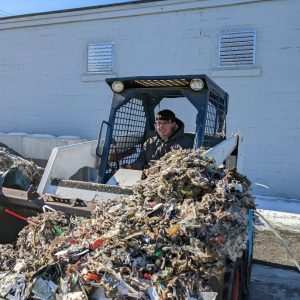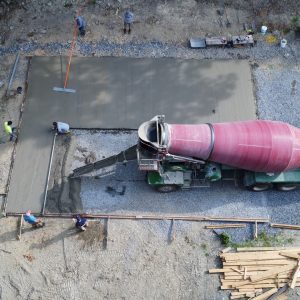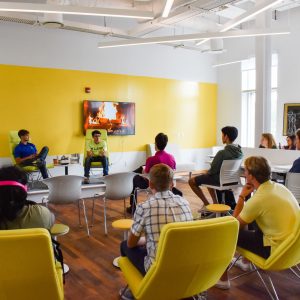 While studying engineering at SUNY Broome Community College and Clarkson University, respectively, cousins Jacob Kumpon (pictured at right) and Jack Lamuraglia knew they wanted to start a business in sustainability—they just didn’t know where to start. “In between classes in the Applied Technology Building, I started cold-calling local recycling centers to ask if we could tour their facilities,” Jacob told SUNY Broome’s The HiveHQ. “During each tour, we asked the same key questions: ‘What are your biggest issues?’ Consistently, the answer was the recycling of post-consumer glass.” Each year, Americans dispose of some 10 million metric tons of glass, one third of which gets recycled. The rest ends up in landfills.
While studying engineering at SUNY Broome Community College and Clarkson University, respectively, cousins Jacob Kumpon (pictured at right) and Jack Lamuraglia knew they wanted to start a business in sustainability—they just didn’t know where to start. “In between classes in the Applied Technology Building, I started cold-calling local recycling centers to ask if we could tour their facilities,” Jacob told SUNY Broome’s The HiveHQ. “During each tour, we asked the same key questions: ‘What are your biggest issues?’ Consistently, the answer was the recycling of post-consumer glass.” Each year, Americans dispose of some 10 million metric tons of glass, one third of which gets recycled. The rest ends up in landfills.
That crucial piece of customer discovery was what sparked the idea to develop a process to clean waste glass—they just needed to determine how to repurpose it. “For the past few years, cement has been a very hot topic,” Jacob explained, referencing the global supply shortage of cement, an active ingredient in concrete. “Not only is cement in high demand, but it comes at a cost to the environment.”
During classes—and amidst Jacob’s transfer to Binghamton University—the founding team launched KLAW Industries in order to bring to life their product: Pantheon™, a supplementary cementing material that’s added into existing cement mixes, increasing the compressive strength and lowering carbon emissions. It replaces 20% of cement in standard mixes, and up to 50% of cement in specialty applications.
 “At the time, we really didn’t have a super defined end market,” Jacob told us. “We knew concrete was where we wanted to go, but not what subsection.” KLAW Industries participated in both Pioneer (Stage 1) and Propel (Stage 2) of the VentureWell E-Team Program, receiving a combined $25,000 in grant funding and comprehensive entrepreneurship training to support their venture. “We learned about customer discovery at more of a refined level than we’d done before. That really got us going.” Jacob said that in the later stages of the program, his team launched pilots, received certifications for their material, and earned key early adopters—all contributing to the growth of their company.
“At the time, we really didn’t have a super defined end market,” Jacob told us. “We knew concrete was where we wanted to go, but not what subsection.” KLAW Industries participated in both Pioneer (Stage 1) and Propel (Stage 2) of the VentureWell E-Team Program, receiving a combined $25,000 in grant funding and comprehensive entrepreneurship training to support their venture. “We learned about customer discovery at more of a refined level than we’d done before. That really got us going.” Jacob said that in the later stages of the program, his team launched pilots, received certifications for their material, and earned key early adopters—all contributing to the growth of their company.
The team effort by KLAW Industries is already paying off, and having a big impact on their local community. This past summer, the city of Binghamton began using Pantheon™ in all its curb and sidewalk upgrades to support new infrastructure through high-quality, low-carbon concrete—a massive technical and commercial milestone for the company. “The environmental impact, both on the concrete side and on the recycling side of our business, is a big reason why we do this. We’re originally from here, and seeing the impact on our local community is a big, big thing,” Jacob told Spectrum News. “Cement is actually one of the biggest contributors of carbon emissions.”
 To date, KLAW Industries has raised over $1.4 million in non-dilutive funding, including a recent $500,000 Small Business Innovation Research Phase II Award from the U.S. Environmental Protection Agency, and first place at the U.S. Department of Energy’s EPIC Prize Pitch Competition, which awarded the team with $100,000 to expand low-carbon concrete throughout New York. “This is a major win that allows us to invest in and expand our operations on Griswold Street in Binghamton,” Jacob said when accepting the EPIC Prize. “The continued collaboration between the city, Barney & Dickenson, and Albert Torto Construction Corp. has brought federal funding and recognition to the cutting-edge work being done right in our backyard.”
To date, KLAW Industries has raised over $1.4 million in non-dilutive funding, including a recent $500,000 Small Business Innovation Research Phase II Award from the U.S. Environmental Protection Agency, and first place at the U.S. Department of Energy’s EPIC Prize Pitch Competition, which awarded the team with $100,000 to expand low-carbon concrete throughout New York. “This is a major win that allows us to invest in and expand our operations on Griswold Street in Binghamton,” Jacob said when accepting the EPIC Prize. “The continued collaboration between the city, Barney & Dickenson, and Albert Torto Construction Corp. has brought federal funding and recognition to the cutting-edge work being done right in our backyard.”
Jacob continues to give back to the ecosystems that helped launch his company. He recently volunteered his time meeting with early-stage innovators during a tour of the Koffman Southern Tier Incubator (KSTI), an on-campus resource center at Binghamton University that provides students with funding, workshop space, and mentorship. “The best time to start a company is when you’re a student because there are resources available,” Jacob advised. “It was how we were able to get all of our seed funding. We saved a ton of equity in the company.” There, Jacob encouraged students to pursue innovation by taking advantage of the wealth of faculty-led courses and programming available through the incubator—including business competitions.
Looking to the future, KLAW Industries recently purchased a 6,000-square-foot facility to further expand production, and the team landed a feature in Forbes for their work to develop a product that protects our planet from the negative impact of carbon emissions. Hear more from Jacob about their entrepreneurial journey:
About the E-Team Program
Through the E-Team Program, VentureWell has trained over 530 student teams and more than 1,300 student innovators. The teams have raised over $600 million in follow-on funding and have launched more than 240 ventures since taking part in our program.
Learn more about VentureWell’s E-Team Program, which supports student-led science- and engineering-based teams from across the nation in bringing their high-impact innovations out of the lab and into the market.